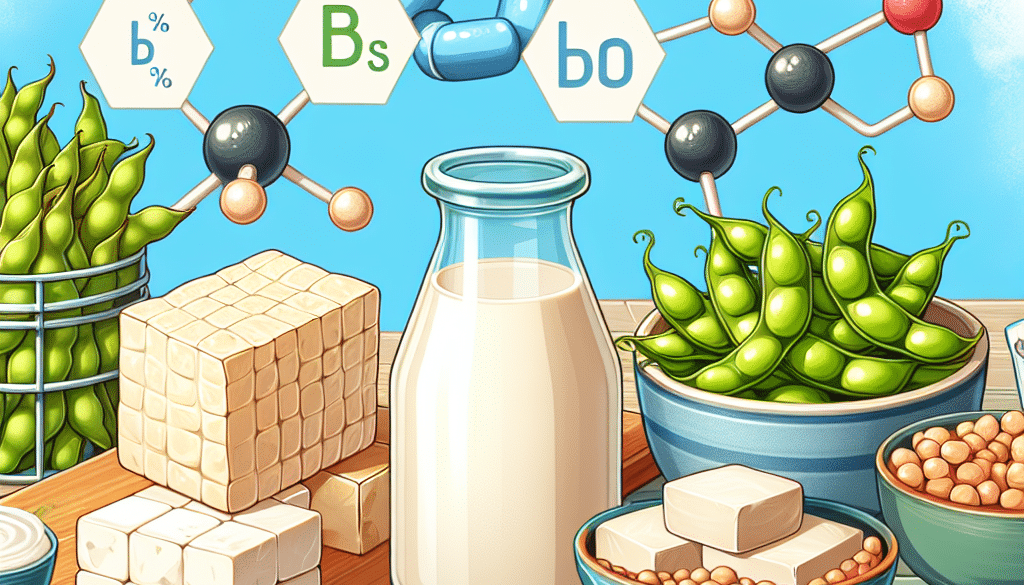Can I Get All My Protein From Soy?
-
Table of Contents
- Protein Power: Is Soy the Complete Source You Need?
- The Nutritional Profile of Soy
- Can Soy Meet All Your Protein Needs?
- Case Studies and Research
- Considerations and Limitations
- Health Benefits and Risks of Soy Consumption
- Health Benefits
- Potential Risks
- Integrating Soy into Your Diet
- Conclusion: Balancing Soy in Your Protein Intake
- Discover ETprotein’s High-Quality Soy Products
Protein Power: Is Soy the Complete Source You Need?

Protein is a vital macronutrient essential for building muscle, repairing tissue, and producing enzymes and hormones. With the rise of plant-based diets, many people are turning to soy as a primary protein source. But can one rely solely on soy for their protein needs? This article delves into the feasibility and implications of getting all your protein from soy.
The Nutritional Profile of Soy
Soybeans are a powerhouse of nutrition, offering a rich source of protein, fiber, vitamins, and minerals. They contain all nine essential amino acids, making them a complete protein source, which is relatively rare in the plant kingdom. Here’s a breakdown of what soy has to offer:
- High-quality protein
- Dietary fiber
- Essential fatty acids
- Various vitamins and minerals such as vitamin K, folate, calcium, magnesium, and iron
- Phytoestrogens (isoflavones), which may have health benefits
Can Soy Meet All Your Protein Needs?
For most adults, the Recommended Dietary Allowance (RDA) for protein is about 0.8 grams per kilogram of body weight per day. Athletes or those with higher protein needs may require more. Soy can contribute significantly to meeting these needs. For example, one cup of cooked soybeans contains about 29 grams of protein, which is more than half the daily requirement for the average sedentary woman.
Case Studies and Research
Several studies have looked at the effects of soy-based diets on health. For instance, research has shown that soy protein can support muscle synthesis effectively, similar to animal proteins. Additionally, populations that consume soy as a staple, such as those in East Asia, often have lower rates of certain diseases and are generally in good health, suggesting that soy can be a primary protein source.
Considerations and Limitations
While soy is a complete protein, there are considerations to keep in mind when relying on it as your sole protein source:
- Variety is key in any diet to ensure a full range of nutrients.
- Some individuals may have soy allergies or sensitivities.
- Excessive consumption of soy has raised concerns about potential hormonal effects due to its phytoestrogens, although research is ongoing and conclusive evidence is lacking.
- Over-reliance on processed soy products can lead to an intake of unwanted additives and preservatives.
Health Benefits and Risks of Soy Consumption
Soy isn’t just about protein; it also comes with potential health benefits and some risks to be aware of:
Health Benefits
- Cardiovascular health: Soy protein has been shown to lower LDL cholesterol and triglycerides, which may reduce the risk of heart disease.
- Weight management: High-protein foods like soy can increase satiety and help in weight management.
- Bone health: Some studies suggest that soy isoflavones may help in maintaining bone density.
- Reduced risk of certain cancers: Research indicates a possible link between soy consumption and reduced risks of breast and prostate cancer.
Potential Risks
- Thyroid function: High intakes of soy may affect thyroid function, particularly in individuals with pre-existing thyroid issues.
- Nutrient absorption: Soy contains phytates, which can interfere with the absorption of minerals like iron and zinc.
Integrating Soy into Your Diet
There are various ways to incorporate soy into your diet:
- Tofu and tempeh: Versatile and can be used in a variety of dishes.
- Edamame: Young soybeans often served as a snack or appetizer.
- Soy milk: A dairy-free alternative for those who are lactose intolerant or vegan.
- Soy nuts and soy protein bars: Convenient options for on-the-go protein.
Conclusion: Balancing Soy in Your Protein Intake
While it is possible to get all your protein from soy, it’s essential to consider the importance of dietary variety for overall health. Soy can be a significant part of a balanced diet, especially for those following a plant-based lifestyle. However, it’s crucial to consume it in moderation and alongside other protein sources to ensure a well-rounded nutrient intake.
Discover ETprotein’s High-Quality Soy Products
If you’re looking to incorporate soy protein into your diet, ETprotein offers a range of high-quality soy products. Their organic bulk vegan proteins are non-GMO, allergen-free, and characterized by a neutral taste, making them an excellent addition to any diet. Whether you’re a manufacturer or consumer, ETprotein’s offerings can meet your protein needs.
About ETprotein:
ETprotein, a reputable protein and L-(+)-Ergothioneine (EGT) Chinese factory manufacturer and supplier, is renowned for producing, stocking, exporting, and delivering the highest quality organic bulk vegan proteins and L-(+)-Ergothioneine. They include Organic rice protein, clear rice protein, pea protein, clear pea protein, watermelon seed protein, pumpkin seed protein, sunflower seed protein, mung bean protein, peanut protein, and L-(+)-Ergothioneine EGT Pharmaceutical grade, L-(+)-Ergothioneine EGT food grade, L-(+)-Ergothioneine EGT cosmetic grade, L-(+)-Ergothioneine EGT reference grade and L-(+)-Ergothioneine EGT standard. Their offerings, characterized by a neutral taste, non-GMO, allergen-free attributes, with L-(+)-Ergothioneine purity over 98%, 99%, cater to a diverse range of industries. They serve nutraceutical, pharmaceutical, cosmeceutical, veterinary, as well as food and beverage finished product distributors, traders, and manufacturers across Europe, USA, Canada, Australia, Thailand, Japan, Korea, Brazil, and Chile, among others.
ETprotein specialization includes exporting and delivering tailor-made protein powder and finished nutritional supplements. Their extensive product range covers sectors like Food and Beverage, Sports Nutrition, Weight Management, Dietary Supplements, Health and Wellness Products, and Infant Formula, ensuring comprehensive solutions to meet all your protein needs.
As a trusted company by leading global food and beverage brands and Fortune 500 companies, ETprotein reinforces China’s reputation in the global arena. For more information or to sample their products, please contact them and email sales(at)ETprotein.com today.












